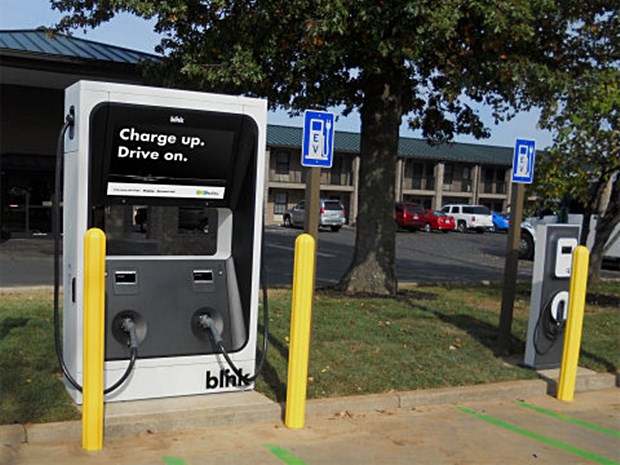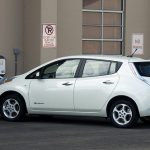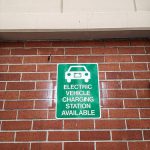Some electric vehicle charging stations cost as much as gas
At little more than 45,000 yearly, sales of zero-emission vehicles may be woefully anemic, but the charging stations that fuel them are doing brisk business.
Miami-based CarCharging Group, for instance, has acquired four companies that boast networks of high-voltage electric vehicle charging stations, totaling 13,430 in all. CEO and founder Michael Farkas believes that the devices will become the preferred mode for electric-vehicle motorists who typically have three recharging options: a 120-volt wall socket (or what you might use for a hair dryer), a 240-volt home charger priced at several thousand dollars, or one that costs $30,000.

An electric vehicle charging station. From NCDOTCommunications.
Besides the price differences, recharging alternatives distinguish themselves by the amount of time it takes to complete the job. A typical AC outlet, for example, will take hours to recharge an electric vehicle (EV), while the most expensive will recharge it in mere minutes.
Charging stations also distinguish themselves by their accessibility — or lack thereof. According to a new study, fewer than half of electric-vehicle owners have an off-street parking spot where they can install chargers. That means they must rely on public stations, which aren’t as plentiful as their gas counterparts.
Eight states—Oregon, New York, California, Maryland, Massachusetts, Connecticut, Rhode Island, and Vermont—are working jointly to change that reality. Their efforts include creating regulations that require stations at sites such as multifamily residences or workplaces, purchasing electric cars for their own fleets (and, in some cases, encouraging local governments to follow their lead), and establishing charging stations with uniform payment methods. The latter is especially key in the northeast, where drivers often commute across state lines.
The coalition, a group that represents a quarter of the country’s car market, hopes to drive the sale of at least 3.3 million zero-emission vehicles by 2025, a target more modest than the Obama administration’s, which aimed for 1 million sales by 2015.

ChargerGroup has acquired some of its competition, like Blink – so they’re expecting demand for electric vehicle charging stations to grow. From ChargerGroup.
The political goodwill extended towards EVs is bolstering the confidence of companies like the CarCharging Group, but it’s not clear that the results will pay off for consumers. The company charges 49 cents per kilowatt-hour for the use of its high-voltage chargers, found at garages around the country. That figure equals the current price of gas for a car that gets 21 miles per gallon; the charge can also run up to four times what people pay to electrify their homes. That’s a significant hike when compared to the national average retail price for electricity; most EVs that recharge using a standard outlet will absorb just 20 cents worth of energy per hour.
Rather than splurge on pricey chargers as Maryland’s transportation department recently did ($12 million for 80 that were installed at the Baltimore-Washington International Airport), states could instead outfit more garages with additional 120-volt outlets. Those require roughly six hours of charging time, but when installed at garages or park-and-ride lots where cars sit idle for hours or days at a time, such as at airports, they may be more economical for both the public sector and consumers.
Related Posts
Category: Green Parking

















